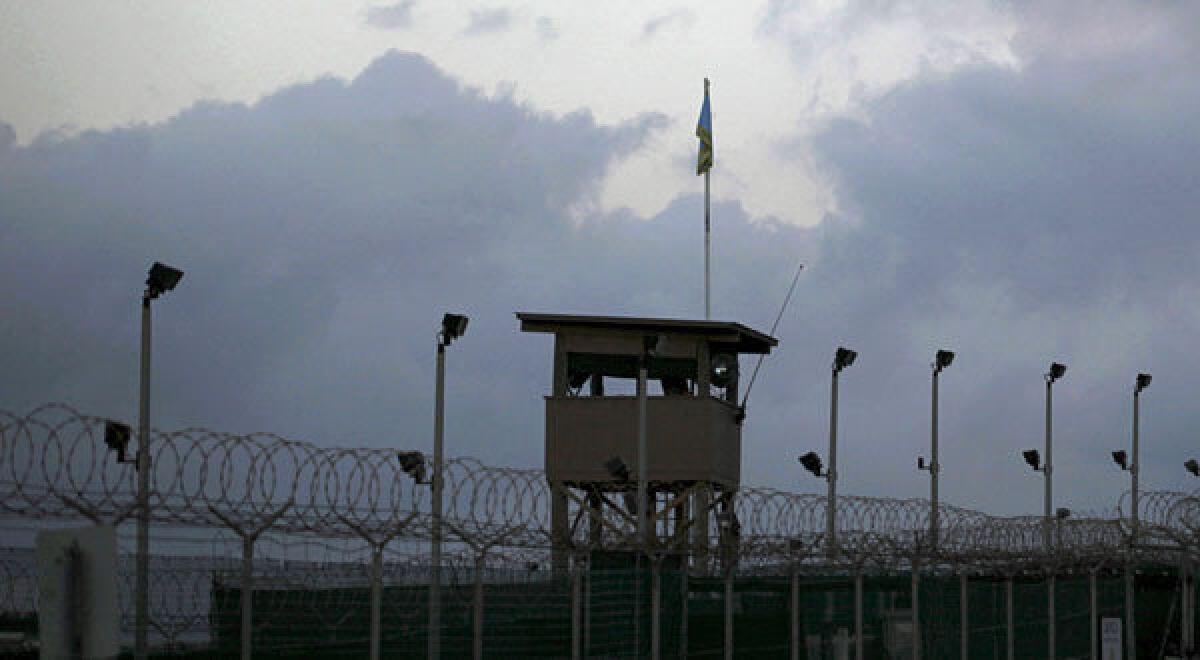Defense team in Sept. 11 case ask to observe Guantanamo conditions

- Share via
FT. MEADE, Md. -- Defense lawyers for five alleged Sept. 11 conspirators asked a judge Tuesday to allow them to spend 48 hours at a time, every six months, with their clients deep inside the heavily secured prison at the U.S. Naval Base on Guantanamo Bay, Cuba, in order to document the conditions there and use that information to persuade a jury against the death penalty should the men eventually be convicted of capital murder.
The highly unusual request, coming on the second day of a weeklong session of pretrial hearings, was challenged by military and government prosecutors who instead would want to permit just “one single visit” and retain strict and complete control over whom the lawyers talk to and what they see, and be in charge of any of the defense lawyers’ written, sketched or photographed observations inside the prison.
Judge James L. Pohl, an Army colonel, did not make an immediate ruling on the matter. But the issue, one of the toughest before him, has wide ramifications that also could envelop other matters, such as evidence collected when the detainees were first held in secret “black site” locations overseas and whether they were tortured or treated harshly in the early years after the 2001 attacks.
One by one, the defense lawyers argued to be allowed inside the prison with a member of their mediation teams and a documentarian to record everything they see and hear.
Navy Lt. Cmdr. Kevin Bogucki, representing Ramzi Binalshib, the alleged pilot cell manager, compared the government’s limited counter-proposal with a “jungle cruise in Disneyland.” He said, “To be essentially shuttled through on a guided tour is entirely unlikely to reveal any meaningful information. It would be for the purpose of show only.”
He added, “There are some things at this prison that were not meant to be made apparent.”
His co-counsel, civilian attorney James Harrington, recalled being escorted through the state prison at Attica, N.Y., while representing a guard there.
“I saw parts of the Attica prison that no one on a tour would see,” he told the judge. “I got to see the corners where you could take people and beat them up. I’m not impugning anyone here, but there are many sides to every prison. It’s an occupational hazard, and that tour was something shocking to me. I saw how things could work.”
David Nevin, a civilian lawyer for alleged Sept. 11 mastermind Khalid Shaikh Mohammed, said that between Mohammed’s arrest in Pakistan in 2003 and his transfer to Guantanamo Bay three years later, “he was tortured and the torture that was inflicted on him bears on many things in this case, including his behavior and his actions in open court, and also his reaction to his current conditions of confinement.”
He added, “We can learn a lot by a 48-hour presence.”
But the government, in legal papers filed against the proposal, countered with just one short visit, if any at all, and stressed that if all rules were not strictly obeyed, it could lead to the “immediate cancellation of the defense visit and/or the immediate removal of defense team members from the confinement facility.”
The hearings are being simulcast at Ft. Meade.
ALSO:
Defining a secure border will be crucial for immigration plan
Government requests for Twitter user data rise 20% in 2012
Grand jury reportedly indicted JonBenet Ramsey’s parents in 1999
More to Read
Sign up for Essential California
The most important California stories and recommendations in your inbox every morning.
You may occasionally receive promotional content from the Los Angeles Times.













